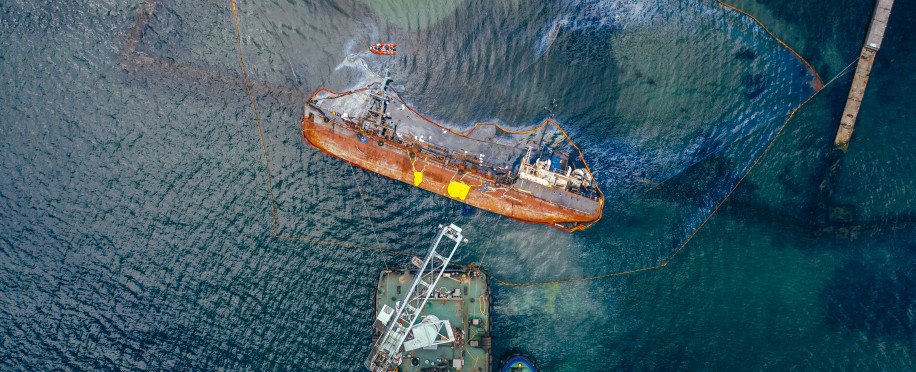Copyright © 2025 lmitac.com All Rights Reserved. Contact - Terms and Conditions - Privacy Policy - Quality Policy - Become an instructor - Vacancies - Sitemap
London Maritime Academy is a trade name for London Premier Groupversion: 2.9.0
London Maritime Academy is a trade name for London Premier Group

Posted on : 11/28/2023, 11:22:29 PM
Last Update : 11/28/2023, 11:22:29 PM
With the world focusing on sustainability and durability, reducing waste and having less effect on the environment. The maritime business could only comply (with vessels being the biggest producer of greenhouse gases GHG). Zero-emission vessels are changing the way we think about green shipping. These ships produce no emissions, are environmentally friendly and can become a great asset to the shipping business.
In this article, we will introduce what zero-emission vessels are and why business owners should get into these ships today.
If we asked you to imagine how much it takes to fuel a ship on a trip across the Pacific Ocean? It's a lot, right? Now imagine all those fuels burned into the air. Is cargo shipping worth all that harm? Well, not anymore!
Zero-emission vessels are the future of global shipping; they do not emit carbon, air pollutants, or otherwise toxic substances into the environment. These marine ships operate on engines that run on zero-emission, sustainable, and renewable fuel sources compared to their traditional counterparts that run mainly on fossil fuels.
Moreover, ZEVs use advanced technologies that include electric batteries, hydrogen fuel cells, and a combination of wind and solar power to achieve green energy production. By integrating these clean energy sources, therefore, a zero-emission vessel helps reduce the environmental effects of shipping activities and transition to a greener form of transport by sea.
Switching over to zero-emission vessels will undoubtedly go a long way in reducing the shipping industry's carbon footprint. This study by Greenpeace International has revealed that biofuel or hydrogen fuel battery cells can reduce carbon dioxide emissions by approximately ninety per cent compared with regular marine engines.
So, with these environmentally powered vessels, the maritime industry can contribute to the decarbonisation of shipping operations and support the mission of sustainability.
If zero-emission vessels are such a fantastic environmental project, why isn't every company competing to build and develop the best ones? Well, there's a reason the competition for this sector could be higher: the funding; the other is complex designs... Let's tap into these challenges in detail:

High Cost: Using innovative and expensive technology to operate ZEVS makes their initial investment and operation costs more elevated than those of conventional vessels. Nonetheless, with time, as the availability of demand enhances maturity, economies of scale will have significant implications for reducing costs.
Limited Infrastructure: Infrastructure for deploying ZEVs, including refuelling stations and electric charging ports, is just in its early stages. Expanding infrastructure internationally and working in partnership with governments, port authorities, and relevant industrial players is essential.
Range and Speed Limitations: These include a low range of motion and low speed compared to traditionally designed vessels. These challenges can only be tackled effectively by necessitating bigger battery capacities or efficient power storing systems.
Based on everything we said, you should drive away from the pathway of these vessels; they're expensive, have few design options, and can't be so good, right?
On a larger scale, though, Imagine a world where shipping no longer contributes to climate change, our oceans are cleaner, and trade and business flourish without compromising the environment. Considering the Significant Increase of Autonomous Ships in the Marine Industry, zero-emission ones sound like the heroes we all need.
Let's demonstrate why these zero-emission container vessels are the most viable option today:
Sustainability: Zero-emission vessels are the prime sustainable solutions to the world's most widespread problems. You can get to know these vessels and how they operate through online maritime courses.
Compliance with regulations: Investing in zero-emission vessels ensures compliance with increasingly strict environmental government and imo released regulations.
Future-proofing: As long as the global goal aims towards decarbonisation, businesses need to share that ambition and invest in zero-emission ships to offer cleaner, greener services and take the initiative to create better solutions.
Market demand: With increased environmental concerns, more companies require emission-free fleet vessels to ship their products. Therefore, investing in zero-emission vessels can position companies ahead of competitors and advance in the market.
Stakeholder expectations: More and more investors, customers, and governments expect businesses to operate sustainably and mitigate their carbon footprint. Zero-emission vessels show commitment to ensuring that they meet this population's expectations, making investment in them worthwhile.
Brand reputation: A company can also boost its corporate social responsibility efforts by investing in zero-emissions vessels, demonstrating its dedication to environmental protection.
Technology advancement: Zero-emission vessels are one of the latest innovations in the industry that contribute towards developing and advancing clean energy technologies with additional business opportunities.
Since zero-emission vessels were launched, the concept of zero-emission shipping has gained momentum and is expected to become the norm soon. So if you want to stay ahead of the curve, get into these vessels today.